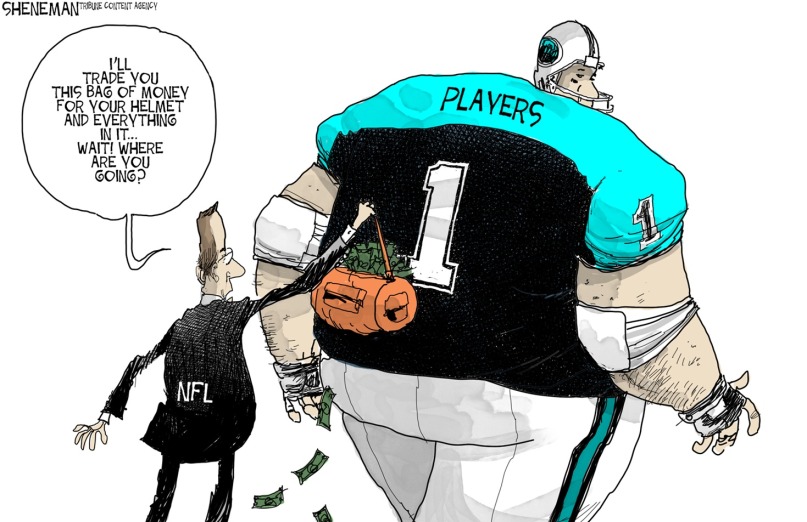American Parents are a Huge Threat to the NFL

By:
As the NFL season begins, it sits as easily the most popular league in America, with its 32 teams splitting $7.2 billion in revenue in 2014 — about $226.4 million per team. But a dark cloud continues to sit on the horizon for the NFL as the safety of football continues to be questioned in light of recent stories of serious brain trauma resulting from the sport.
The NFL's current dilemma, summed up perfectly by this cartoon from Dave Sheneman, is that, despite eye-popping revenue, there is a deep fear that all of the money in the world might not be enough to save the league from declining participation in the sport due to head injuries.
 Drew Shenemean / Tribune - reporternews.com
Drew Shenemean / Tribune - reporternews.com
"Weird things are happening. One is that there seems to be no limit to the amount that we can discuss the problems with the game — the idea that so many former NFL players are essentially decrepit," sportswriter Chuck Klosterman told the Radiolab podcast last fall. "At the same time, there seems to be no limit to the popularity of the sport."
A few NFL and college players have left the sport this year over concerns about their brain health, most notably the San Francisco 49ers' Chris Borland. Borland, a 24-year-old linebacker who had a great first season in the NFL, told ESPN last month that "if there were no possibility of brain damage, I'd still be playing."
But it would be an overstatement to say that the pro and college ranks have seen a sharp decline in players, or that there is some sort of consistent exodus from the top of the sport. What's more concerning for football in America is not the men at the top, but instead the parents of young boys who are opting out of football. Between 2009 and last year, football participation among 9- to 17-year-olds declined by almost 17 percent, according to a recent study commissioned by the Sports and Fitness Industry trade association. That decline is far worse than declines suffered by other major American youth sports: baseball (-4.3 percent), soccer (-8.4 percent), and basketball (-6.8 percent).
Parents are less interested in their sons playing football...even NFL players who are parents.
Increasing awareness of the effects of the innumerable hits to the head you'll endure as a football player has given parents pause about signing their kids up for youth football. LeBron James, who has two young sons and is a former high school football standout himself, is like many of his fellow parents in his unwillingness to let his sons play football.
"Only basketball, baseball and soccer are allowed in my house," James told ESPN. "It's a safety thing. As a parent you protect your kids as much as possible. I don't think I'm the only one that's not allowing his kids to play football."
A few on-field deaths and severe injuries in high school football have also raised concern about the sport. Then, of course, there are the suicides of former NFL players such as Junior Seau and Dave Duerson — two tragic deaths that have raised the profile of the sport's dangers.
The result is that even former NFL stars such as Terry Bradshaw, Troy Aikman, and Brett Favre are not sure that they'd push their sons to play football. (Granted, none of them actually have young sons. The questions were posed as hypotheticals.)
Are we seeing the beginning of the end?
The threat to football, then, is not a sudden blow to the popularity of the NFL or college football. It's instead an erosion of the sport's popularity from the grass roots level, as fewer boys sign up for youth football, there will be fewer young men ready to play at high levels a decade from now.
Tens of millions of Americans will closely follow football this year, setting fantasy football lineups and betting on games. There's no doubt that the sport is a juggernaut. But sports juggernauts have failed before. As is often pointed out, in the 1930s, the most popular sports in America were baseball, boxing, and horse racing. The latter two shrunk into narrow niche interests, while baseball was passed by football as the country's top dog. Will we someday say the same thing about football? Only time will tell.
